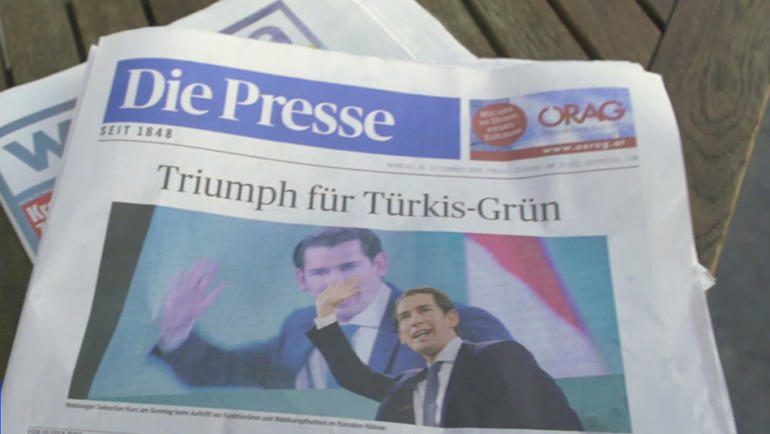Former Austrian Chancellor Sebastian Kurz said he will talk with “all parties” about forming a coalition government. Kurz’s conservative party came out on top in Sunday’s election but fell short of a majority.
And coalition talks are expected to be long and difficult. CGTN’s Natalie Carney reports from Vienna.
Forming Austria’s next coalition government will not be easy. Once the excitement of the election win had died down, Sebastian Kurz and his center right People’s Party (OVP) will have to begin negotiations with unlikely partners.
The OVP’s former coalition ally, the far-right Freedom Party (FPO), lost core votes due to a series of corruption scandals. They have chosen to reform themselves and focus on being in the opposition. “I can tell you that a difficult time always leads to making the best from this bad situation and make the right decisions,” Norbert Hofer, FPO Chairman, said. “. It is a great chance and we will grab this chance.”
A return to a “grand coalition” with the Social Democrats (SPO), which dominated Austrian politics for decades, is also unlikely said Paul Ronzheimer who has written a biography on Sebastian Kurz. “In 2017 Sebastian Kurz came into power because he promised a change after so many years of a big coalition,” Paul Ronzheimer, Deputy Chef Editor at Bild explained. “So, for him, it would be difficult to explain to his voters why he would go back to the social democrats.”
The most likely coalition seems to be between the OVP and the Greens. Yet, ideologically, these two parties are polar opposites. “Economically, the OVP is liberal, they want to cut taxes. The greens want to gather new taxes, like a carbon tax,” Julia Partheymueller, from the Vienna Centre for Electoral Research, said. “Culturally, especially under Kurz, the OVP has taken a very critical stance against immigration. The greens are the party whose most positive towards immigration.”
The Greens’ leader, Werner Kogler, said they would need to see “radical change” in Kurz’s right-wing policies before they would consider a coalition.
All this could drag coalition negotiations over weeks, even months said analysts. If common ground cannot be found, Kurz could find himself back where he began in a coalition with the Social Democrats.
Which coalition finally emerges will determine how Austria’s new government deals with the pressing issues of the environment, immigration and the economy.
 CGTN America
CGTN America
